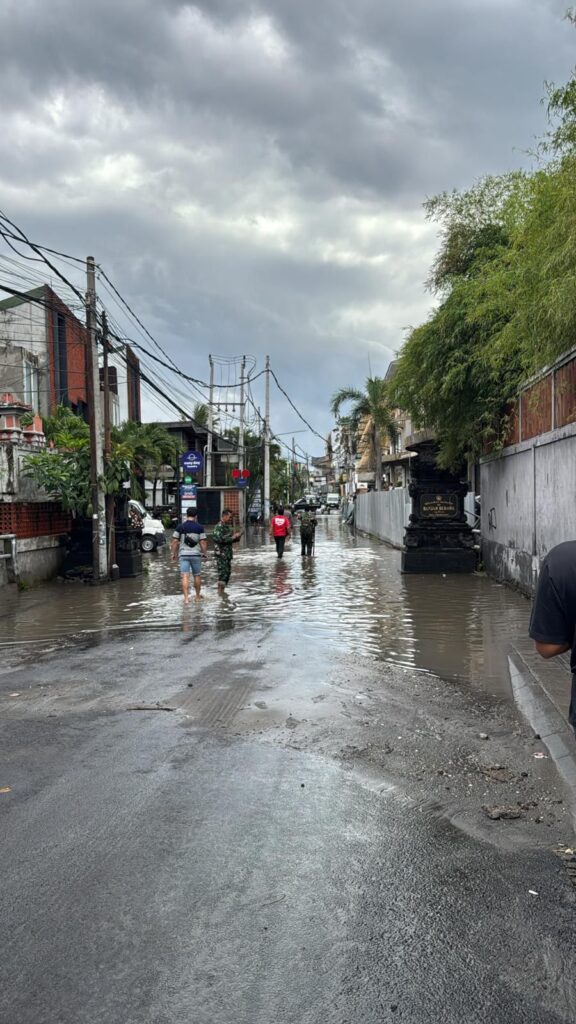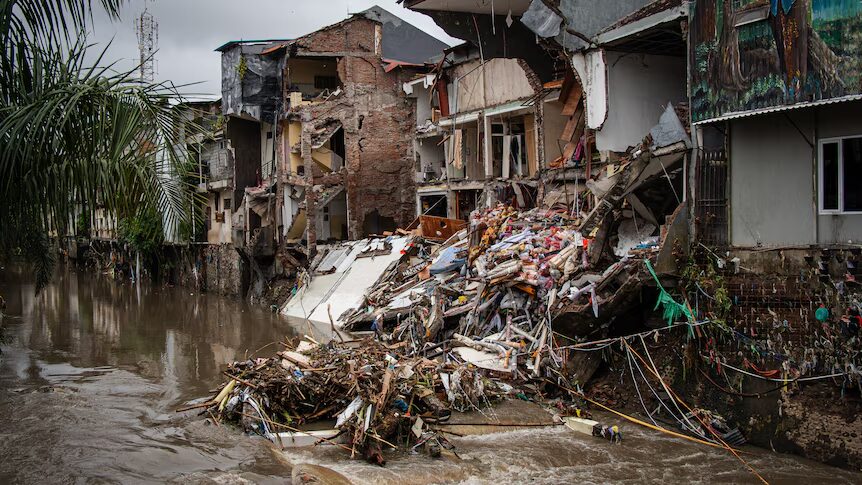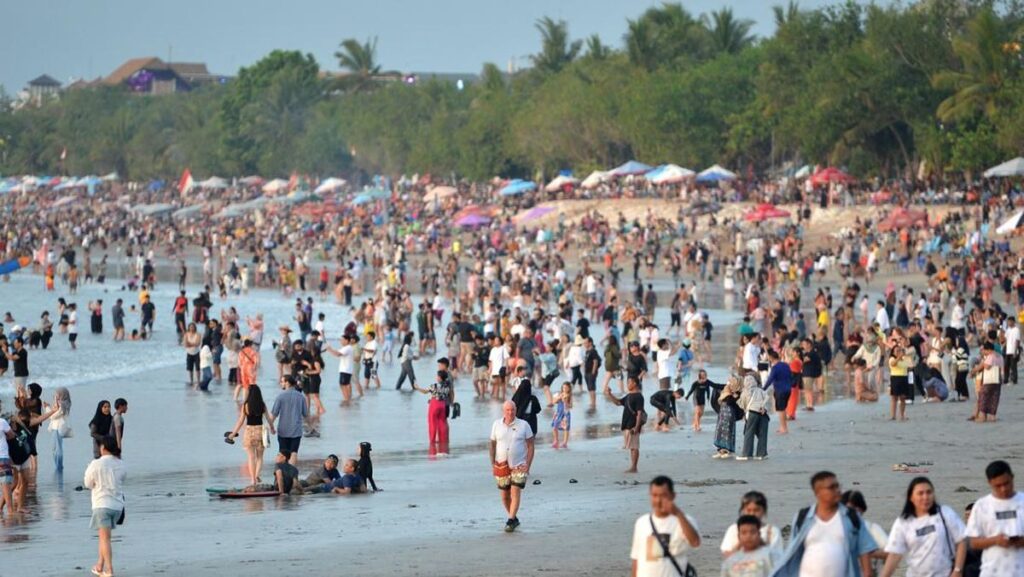The last weeks have been hard for Bali; the island has been impacted by heavy rain, which resulted in flooding and caused at least 14 people’s deaths. This heavy rain had not happened in around a decade.
The climatological station in Bali reported more than 385 mm of rain in a 24-hour period. Due to the flooded homes, hundreds of residents have been evacuated since Tuesday, September 9. Major routes have been stopped by landslides, and at least two bridges have been destroyed.
The flooding in Bali didn’t happen without reason. In addition to changing weather patterns, overtourism is also blamed as one of the contributing factors.
In this article, we explore how overtourism can have a significant impact on Bali. We also share the firsthand story of a foreigner who recently moved to Bali for the first time and had to face the recent flash floods.
Key Takeaways
- Bali’s worst flood in 2025 left at least 14 dead, hundreds evacuated, and major infrastructure damaged.
- Climate change has intensified extreme rainfall, with over 385 mm recorded in just 24 hours.
- Overtourism and land conversion reduced Bali’s natural flood protection, especially rice fields with the Subak irrigation system.
- Government action now bans new tourism development on farmland as part of a 100-year sustainability plan.
Planning a Bali villa? Discover ideas with Ilot Property Bali
Experiencing Bali Flood 2025
The following section reflects the views and personal experiences of a foreigner living in Bali who shared their story with us.

Naturally, I was aware of the rainy season when I decided to go to Bali for my internship starting in September.
Many people had already warned me that it was not the best time to go. Coming from the Netherlands, I thought I was used to rain and that bringing a raincoat would be enough.
But I underestimated the rainfall here, especially since this year’s rain turned out to be the heaviest in a decade.
My first week was fine: sunny, pleasant, and without a drop of rain. The forecast for the following week predicted showers every day, but I soon learned that weather forecasts in Bali are not always reliable. Then the heavy rains arrived.
It was only my second week of the internship, and I wanted to show up at the office. At the time, I didn’t realize that floods were already happening. I tried to order a Grab, but none were available.
With good intentions, I decided to walk. It was tough the rain was pouring down, the sidewalks were almost impossible to use, and the traffic was overwhelming. Fortunately, I arrived safely at the office, but the same problem returned when I had to go home.
Again, no drivers were available. Without a driver’s license, I couldn’t rent a scooter either. Watching videos of the flooding later that day, I realized just how serious the situation had become.
For the rest of the week Bali no longer felt like Bali. People worked hard to get things back to normal. By the weekend conditions improved and transport was easier again.
Unfortunately, the following Monday, the heavy rain started again. I tried to get to the office, and this time I managed to get a driver. However, halfway through the journey I got scared, so I asked the driver to turn back and bring me home. Later, I read a message that the office had also been closed due to the weather conditions.
I am only in week three of my internship, so I will probably experience many more rainy days some of which may keep me at home or delay my plans.
Still, I am excited about what comes next. Even with all the rain, it is an amazing experience to be here, and I believe it will also make Bali even greener.
Read More: Is Bali a Safe Place to Live? 5 Tips for Risk-Free Villa Purchase in Bali
What Made Bali’s 2025 Floods So Severe?

Landslides and flash floods are common across the Indonesian archipelago, especially during the rainy season, according to authorities. However, climate change and Bali overtourism have made matters worse.
According to new research from the National Research and Innovation Agency (BRIN), Indonesia’s climate has entered a new stage of “next-level climate change.”
Meaning that the rainy season will get longer, but there are also more dry days without rain. This happened because of the increase in global temperature, which has now reached 1.5°C.
“Climate change causes ocean warming, which then leads to more frequent extreme rainfall,” said Yuyun Harmono, a climate and energy campaigner with Greenpeace Indonesia.
Major floods in Bali brought on by the severe rains show how climate change is having an increasing impact on people’s livelihoods. “The climate crisis makes the weather less hospitable for humans and other living creatures,” he added.
How Overtourism Contributed to Bali’s Worst Flooding

According to the director of the Bali Environmental Forum, Made Krisna Dinata, or known as Bokis, one of the main causes of Bali’s flooding problem is overtourism.
While extreme rainfall is a factor, he believes other issues have made the situation worse, including the conversion of massive green spaces and rapid construction driven by tourism demand.
As agricultural land is gradually turned into buildings to meet the surge of visitors, Bali has reduced its natural open land, making it harder for rainfall to be absorbed. He described this process as “environmental degradation.”
“Environmental degradation, characterized by the conversion of agricultural land into buildings, is one of the root causes,” he explained.
He also emphasized that rice fields have long protected Bali from floods because of their traditional irrigation system called Subak. This system distributes water evenly so it doesn’t pool. With subak, one hectare of rice fields in Bali can hold up to 3,000 cubic tons of water.
If agricultural land and the subak system continue to be replaced by buildings, the natural hydrological balance will be disrupted. “Water will no longer be contained or irrigated properly, leading to floods like the ones we see today,” he added.
This environmental degradation is also supported by a study published in the Tunas Agraria Journal in September 2024. Between 2018 and 2023, Bali lost thousands of hectares of rice fields to construction projects:
- 784.67 hectares in Denpasar City
- 2,676.61 hectares in Tabanan Regency
- 1,276.97 hectares in Gianyar Regency
- 1,099.67 hectares in Badung Regency
Put simply, as more land is converted into buildings, Bali’s natural hydrological system is disrupted. Without open land and rice fields to absorb water, floods become inevitable.
Read More: New Regulations Are Changing How You Buy Property in Bali
How Can Bali Tackle This Problem?
To solve Bali’s flooding challenge, two major issues need to be addressed: climate change and overdevelopment. These are not easy problems to fix, but progress is possible.
The Challenge of Climate Change
Climate change is not unique to Bali—it’s a global issue. Unfortunately, it is still not taken seriously by many.
Looking at the Paris Agreement goal to hold the increase in the global average temperature to well below 2 degrees Celsius by the second half of the 21st century. By reducing greenhouse emissions and trying to use clean energy.
For Bali, the challenge is significant. Scooters are the main mode of transport, and most of them are old models. Older and modified scooters emit two to four times more carbon monoxide and hydrocarbons than trucks, making them extremely harmful to the environment.
One solution could be improving road infrastructure to make walking easier, while also encouraging green transportation options to cut emissions.
Reducing Plastic and Waste
Another step is to reduce single-use plastics. Trials or restrictions on plastic bags and disposable items can help limit waste and pollution.
At the same time, better waste management systems are needed to cope with the growing amount of garbage produced by both residents and visitors.
Tackling Bali Overtourism
Bali overtourism also plays a major role. Implementing sustainable tourism practices and controlling visitor numbers will help reduce the pressure on Bali’s natural resources.
Hotels and businesses can also support eco-friendly practices—using organic products, cutting down on plastic, and properly separating waste.
Read More: How Eco-Friendly Villas Add More Value to Your Bali Investment
Government Action for the Future
Fortunately, steps are already being taken. In 2025, Governor Wayan Koster introduced a long-term strategy to protect Bali from overexploitation. The Bali Provincial Government has officially banned new tourism development on agricultural land.
This regulation is part of the island’s “tourism cleanup” initiative and marks the beginning of the 100-year Bali Development Plan (2025–2125).
Change will not happen overnight, but if these strategies are followed, Bali can remain as beautiful as ever—protected for both locals and future generations.

